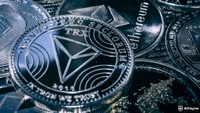Free Airdrop Season 7 is LIVE! Answer fun questions or do simple tasks to earn rewards from the $30K BitDegree prize pool. Participate Now ! 🔥
NCRI Study Reveals the Impact Twitter Bots and Elon Musk has on Altcoin Prices
A new study reveals that Twitter bots and tweets from high-profile entities have a major influence on altcoin prices.
A recent study from the Network Contagion Research Institute (NCRI) has revealed that Twitter bots and tweets from high-profile people like Tesla's CEO, Elon Musk, played significant roles in influencing the prices of various altcoins.
The NCRI's research analyzed over 3 million tweets linked to 18 FTX-listed cryptocurrencies and posted from 2019 to 2023.

Did you know?
Subscribe - We publish new crypto explainer videos every week!
How to Create an NFT: Easiest Way (Animated Explainer)


The research data published on August 2nd revealed that Twitter bots had been systematically used to inflate the prices of certain altcoins. These include well-known cryptocurrencies such as The Sandbox (SAND), Gala (GALA), Gods Unchained (GODS), and LooksRare (LOOKS).
In addition to the bots' influence, specific memecoins like Pepe (PEPE) and PSYOP were also affected by Musk's tweets, with his Pepe-related meme tweet causing a 50% price increase within 24 hours.
Therefore, in its study, the Network Contagion Research Institute raised a serious question, "did FTX or Alameda engage in coordinated inauthentic activity on social media to artificially inflate market values?”
After a thorough investigation, the NCRI found that:
In fact, for half of the FTX listed coins in the sample, inauthentic tweet volume showed signs of forecasting subsequent price. This suggests that inauthentic networks successfully and deliberately deployed to influence changes in FTX coin prices.
Elon Musk's impact on the crypto market has been thoroughly detailed in the study, revealing that his tweets and the timing of Twitter bot activity seemed to be coordinated to influence specific tokens' values.
This study's findings highlighted social media's influence on the financial market, particularly within the realm of cryptocurrencies. Whether through orchestrated Twitter bot campaigns or tweets from influential figures like Elon Musk, the dynamics of the market are being shaped in ways that were previously not understood.
Investors, regulators, and market enthusiasts are now left to grapple with these insights, which could have profound implications for market integrity and the regulation of digital assets. The full extent of this influence and its potential ethical and legal ramifications remain to be seen, making it a subject of keen interest and likely further investigation in the near future.























